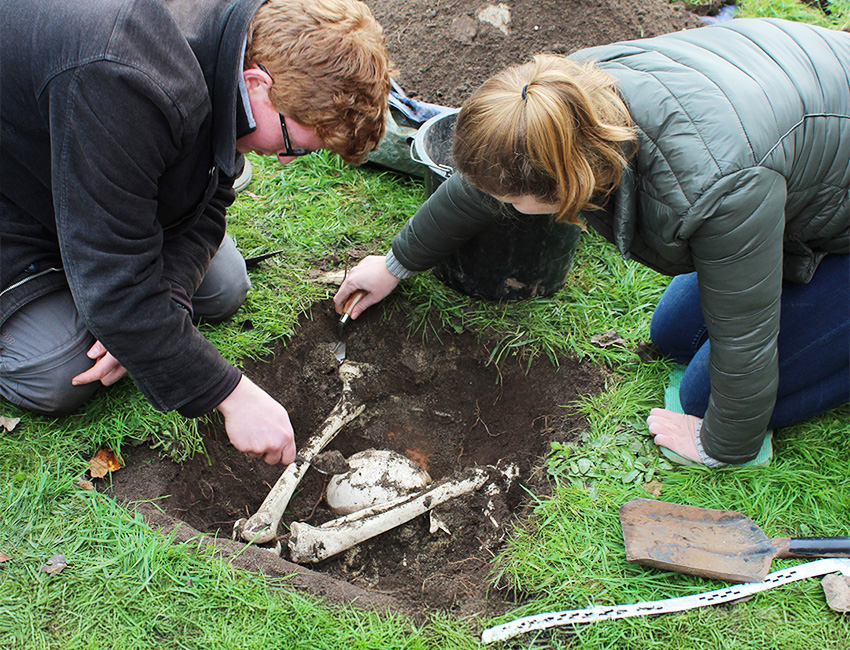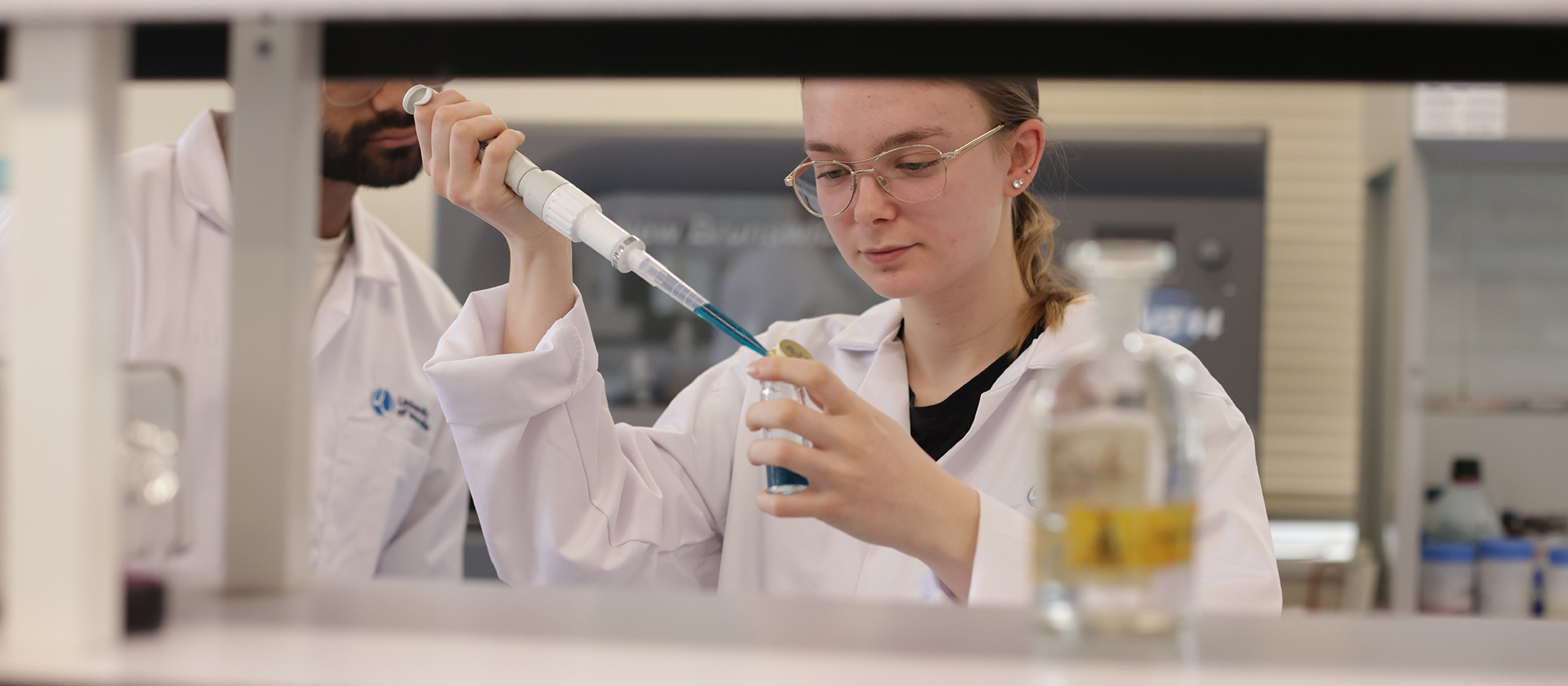At Worcester, our Forensic and Applied Biology degree bridges the disciplines of forensic and biological science, providing you with a thorough understanding of the 'what' and the 'how' and 'why' behind forensic investigations.
in the UK for Student Satisfaction
of students are in work and/or further study
Overview
This Forensic Biology degree combines the study of biology with forensic science, meaning you’ll develop an in-depth understanding of forensic investigation and analysis while gaining skills in biological sciences.
By studying this course, you’ll gain a comprehensive understanding of life processes, from the sub-cellular level to the whole organism, through the study of biochemistry, anatomy, and physiology. You’ll explore health and disease at individual, community, and societal levels, helping you understand how various conditions affect the human body. Additionally, you’ll gain hands-on experience interpreting forensic evidence, following proper procedures in crime scene investigations, while working alongside a range of forensic specialists such as forensic biologists, drug investigators, archaeologists, and anthropologists.
Developing practical skills through hands-on experience is a key part of this course. Our dedicated crime scene simulation house, a semi-detached residential property on our St John’s Campus, provides an immersive setting for working through real-world scenarios. You’ll practice your crime investigation skills by excavating bodies, collecting physical evidence such as fingerprints or fibre samples, and analysing your findings in our state-of-the-art laboratories.
Learning from industry experts who can draw on their own experiences in the field, and hearing from guest speakers like local police forces and forensic scientists, will demonstrate how these skills and experiences can be applied in actual investigations. By working through real case studies and simulated scenarios, you’ll gain a genuine understanding of the role of biological and forensic science in criminal investigations.
Course content
Each year, you will study a mix of mandatory and optional modules. This flexible course lets you explore different subjects within biological and forensic science to suit your interests and career aspirations, giving you versatility and a diverse range of skills that employers highly value.
We regularly review our courses to reflect the latest research and developments in the subject area, as well as feedback from students, employers and the wider sector. As a result, modules may change to ensure the course remains current and relevant.
Optional modules will run if enough students choose to study them. It is not guaranteed that all modules will be offered every year.
Optional modules
Careers
This course provides you with the core biology skills and knowledge to make you suitable candidates for all the biological careers available to students on mainstream biology programmes, as well as forensic areas.
You could work as a:
- Crime Scene Officer
- Environmental Health Officer
- Forensic DNA Analyst
- Forensic Toxicologist
- Hospital Technician
- Medical Researcher
- Police Laboratory Technician
- Public Health Researcher
Our strong connections with local police forces, forensic suppliers, and wildlife trusts offer valuable work experience and research opportunities, ensuring you graduate with practical skills and professional connections. By studying BSc Forensic and Applied Biology, you’ll develop a diverse skill set, including primary research using both quantitative and qualitative methods, data collection and analysis, verbal communication, critical evaluation, and laboratory techniques.
These transferable skills will help you to succeed in biological sciences, forensics, or various other fields, including teaching, scientific publishing, environmental management, and healthcare.
Forensic and Applied Biology | Student View
Course highlights
Teaching and assessment
Our course has been designed by award-winning academics and industry specialists to prepare you for a career in forensic biology. Teaching is a mix of practical lab work, fieldwork, group tutorials and skill sessions.
Evaluation is not all about written assignments and exams; you’ll also be assessed on your lab skills, give an expert witness testimony in our mock courtroom, and have the opportunity to lead your own research project.
Teaching and assessment contents
Teaching
You are taught through a combination of lectures, practical work, field work, video presentations, group tutorials, discussions, directed reading, and formative assessments. The first year also includes study skills sessions. The course is very practical and offers you the opportunity to undertake an independent project in your third year. The emphasis on the development of 'hands on' practical skills will provide you with useful skills for your future career.
In addition, meetings with personal academic tutors are scheduled on at least 4 occasions in the first year and three occasions in each of the other years of a course.
You have an opportunity to take a work experience module in your second or third year, to engage with an Erasmus scheme and spend a semester abroad, or to become involved in staff research through the Vacation Research Assistantship Scheme.
Meet our Forensic and Applied Biology lecturers
Entry requirements
UCAS tariff points required: 96 - 104
| Qualification | Grade |
|---|---|
| A-level | CCC - must include A2 Biology and A2 another science, maths or statistics |
| A-level | BCC - must include A2 Biology |
| BTEC National Extended Diploma | MMM/DMM |
| T-level | Pass (C or above) |
We do accept Access to HE Diplomas and other qualifications which may not exactly match the combinations above. Work out your estimated points with the UCAS tariff calculator.
Any questions?
If you have any questions about entry requirements, please call our Admissions Office on 01905 855111 or email admissions@worc.ac.uk.
Fees
Fees contents
UK and EU students
In 2026/27 the standard fee for full-time home and EU undergraduate students on BA/BSc/LLB degrees and FdA/FdSc degrees is £9,790 per year.
Tuition fees are reviewed annually and may increase each year for both new and continuing students.
For more details on course fees, please visit our course fees page.
International students
In 2026/27 the standard tuition fee for full-time international students enrolling on BA/BSc/LLB degrees and FdA/FdSc degrees is £17,200 per year.
Tuition fees are reviewed annually and may increase each year for both new and continuing students.
For more details on course fees, please visit our course fees page.
Student case studies
Some recent graduates reflect on their time on the course.
How to apply
How to apply contents
Applying through UCAS
UCAS is the central organisation through which applications are processed for full-time undergraduate courses in the UK.
Read our how to apply pages for more information on the application process, or if you’d like to apply for part-time study.
Forensic and Applied Biology BSc (Single Honours) - FC41
Contact
If you have any questions, please get in touch. We're here to help you every step of the way.

Admissions Office
admissions@worc.ac.uk01905 855111More to explore
Open Days
Visiting us is the best way to get a feel for student life at the University of Worcester.

The City of Worcester
Worcester is a welcoming university city with great transport links and plenty of student parking.

Accommodation
Benefit from our accommodation guarantee. We have rooms on campus to suit every budget including en-suite options.

















